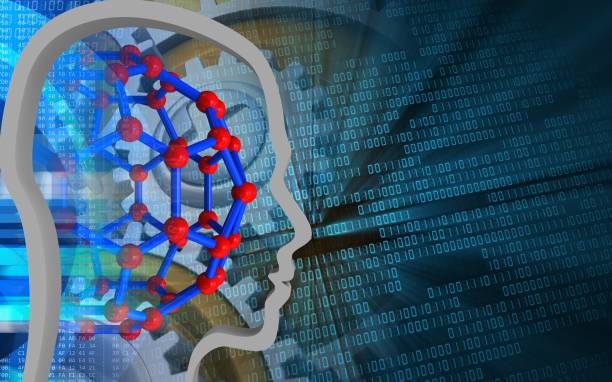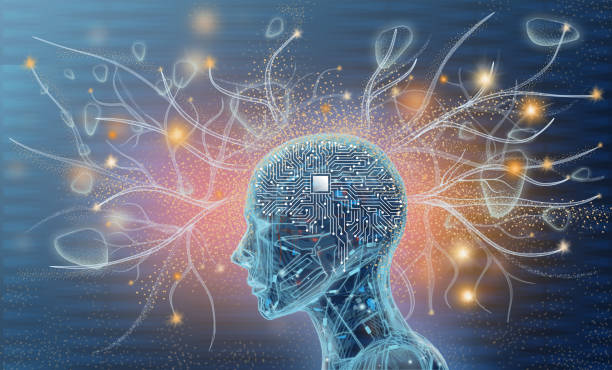What is Artificial Intelligence? Definitions and Key Concepts

#Artificial_Intelligence (AI) is a branch of computer science that deals with building machines capable of performing tasks that usually require human intelligence.
These tasks include learning, problem-solving, decision-making, pattern recognition, and natural language understanding.
In simpler terms, the goal of AI is to simulate human thought processes in machines.
Artificial intelligence is no longer a distant concept; it is rapidly becoming an integral part of our daily lives.
From voice assistants like Siri and Alexa to recommendation systems on Netflix and Amazon, AI is everywhere.
This technology not only makes our lives easier but also has the potential to create fundamental changes in various industries.
To better understand AI, it is important to be familiar with its key concepts.
These concepts include Machine Learning, Deep Learning, and Neural Networks.
Machine learning allows machines to learn from data without being explicitly programmed.
Deep learning is a subset of machine learning that uses neural networks with many layers to analyze data.
Neural networks are computational models inspired by the structure of the human brain.
Are you bothered by losing customers who visit your site to make a purchase?
Rasaweb is your specialized solution for having a successful online store.
✅ Significant increase in your online sales
✅ Creating trust and professional branding with customers⚡ Get free consultation from Rasaweb experts!
History of Artificial Intelligence: From Dream to Reality

The history of artificial intelligence dates back to the 1950s, when scientists and researchers began exploring the possibility of building machines that could think like humans.
During the early decades, significant advances were made in developing algorithms and programming languages related to AI.
However, despite these advances, AI faced many challenges, including hardware limitations and a lack of training data.
In the 1980s and 1990s, interest in AI waned, a period known as the “AI Winter.”
But, in the early twenty-first century, with significant advances in hardware, access to Big Data, and the development of new algorithms, AI returned to the spotlight.
Today, we are witnessing amazing advances in the field of AI, including the development of self-driving cars, facial recognition systems, and natural language processing.
AI is no longer a dream but has become a tangible reality that is changing the world.
Types of Artificial Intelligence: From Expert Systems to Deep Learning

Artificial intelligence can be divided into different types, based on capabilities and methods used.
One common method is to divide AI into two general categories: Narrow AI and General AI.
Narrow AI refers to systems designed to perform a specific task, such as facial recognition or language translation.
These systems perform very well at their task, but they cannot perform other tasks for which they have not been trained.
General AI refers to systems that are capable of doing anything a human can do.
This type of AI is still a theoretical concept and has not yet been fully realized.
In addition, AI can be categorized based on the methods used.
Some common AI methods include Expert Systems, Machine Learning, and Deep Learning.
Expert systems use specialized knowledge to solve complex problems.
Machine learning allows machines to learn from data without being explicitly programmed.
Deep learning is a subset of machine learning that uses neural networks with many layers to analyze data.
Applications of Artificial Intelligence in Various Industries

Artificial intelligence currently has widespread applications in various industries and has the potential to create fundamental transformations in these industries.
In the field of healthcare, AI is used to diagnose diseases, develop drugs, and provide personalized care.
In the automotive industry, AI plays an important role in the development of self-driving cars.
In the financial field, AI is used to detect fraud, manage risk, and provide personalized financial services.
In the retail industry, AI is used to improve customer experience, optimize the supply chain, and predict demand.
In addition, AI has many applications in other areas such as education, agriculture, energy, and entertainment.
For example, in education, AI can be used to provide personalized training and assess students.
In agriculture, AI can be used to optimize resource use and increase productivity.
In the energy industry, AI can be used to optimize energy consumption and predict energy needs.
In short, AI has the potential to create fundamental transformations in various industries and will play an important role in the future.
Does your current online store design not deliver the sales you expect?
Rasaweb specializes in professional online store design!
✅ An attractive and user-friendly site aimed at increasing sales
✅ High speed and security for an ideal shopping experience⚡ Get a free online store design consultation with Rasaweb!
Machine Learning: The Backbone of Artificial Intelligence

Machine Learning, as one of the main pillars of #Artificial_Intelligence, allows machines to learn from data without being explicitly programmed.
In fact, machines use various algorithms to identify patterns and relationships in the data and use them for prediction and decision-making.
Machine learning can be divided into three main categories: Supervised Learning, Unsupervised Learning, and Reinforcement Learning.
In supervised learning, the machine is trained using labeled data.
This means that the data is provided to the machine along with the correct answer, and the machine tries to find a relationship between the data and the answers.
In unsupervised learning, the machine is trained using unlabeled data.
In this case, the machine must automatically identify patterns and structures in the data.
In reinforcement learning, the machine learns through trial and error how to act in a particular environment to receive more rewards.
Machine learning is used in various fields such as facial recognition, voice recognition, spam filtering, and product recommendation.
This technology plays an important role in the advancement of artificial intelligence.
Deep Learning: The Revolution of Artificial Intelligence
![]()
Deep Learning is a subset of machine learning that uses neural networks with many layers to analyze data.
These networks are inspired by the structure of the human brain and are capable of learning complex patterns in data.
Deep learning has become one of the most important areas of artificial intelligence in recent years due to significant advances in hardware and access to big data.
This technology has performed very well in various fields such as image recognition, natural language processing, machine translation, and speech recognition.
One of the main advantages of deep learning is that it can automatically extract important features from the data.
This means that there is no need to manually design features, which can save a lot of time and effort.
Deep learning is currently used in many AI applications and is expected to play an important role in the future of AI.
| Algorithm | Application |
|---|---|
| Convolutional Neural Networks | Image recognition |
| Recurrent Neural Networks | Natural language processing |
The Future of Artificial Intelligence: Opportunities and Challenges

The future of artificial intelligence is full of opportunities and challenges.
On the one hand, AI has the potential to solve many complex problems, including incurable diseases, climate change, and poverty.
On the other hand, AI can lead to widespread unemployment, discrimination, and privacy violations.
One of the most important challenges facing AI is the development of systems that are reliable, fair, and secure.
It is also necessary to establish laws to regulate the use of AI to prevent its misuse.
However, despite these challenges, AI has the potential to create positive transformations in the world and can help improve people’s lives.
The future of AI requires collaboration between researchers, policymakers, and the general public to ensure that this technology is used for the benefit of all.
In today’s world, artificial intelligence has become a driving force for innovation and progress, going beyond a simple tool.
| Challenge | Description |
|---|---|
| Ethical issues | Automated decision-making and accountability |
| Privacy | Protection of personal data against misuse |
The Impact of Artificial Intelligence on the Job Market

Artificial intelligence will have a wide-ranging impact on the job market.
On the one hand, AI can lead to the automation of many jobs, especially jobs that are repetitive and routine.
This can lead to widespread unemployment, especially for workers who do not have the skills to adapt to change.
On the other hand, AI can lead to the creation of new jobs, especially in areas related to the development, deployment, and maintenance of AI systems.
Also, AI can help increase productivity and improve working conditions.
For example, AI can be used to perform dangerous or strenuous tasks, which can help reduce occupational injuries and improve the quality of life of workers.
To adapt to the changes caused by AI, workers need to learn new skills and adapt to new conditions.
It is also necessary for governments and organizations to implement programs to train and empower workers so that they can succeed in the new job market.
Are your online sales not as expected? With Rasaweb, solve the problem of low sales and poor user experience forever!
✅ Increase visitor-to-customer conversion rate
✅ Create a pleasant user experience and increase customer trust
⚡ Act now for a free consultation!
Ethical Considerations of Artificial Intelligence

The development and use of artificial intelligence is associated with several ethical considerations.
One of the most important ethical considerations is the issue of discrimination.
AI systems can unintentionally reinforce existing biases in society if they are trained with biased data.
For example, a facial recognition system may be less accurate at recognizing the faces of people with dark skin if it has been trained with data that mainly includes the faces of people with light skin.
Another ethical consideration is the issue of privacy.
AI systems often require a large amount of personal data to function effectively.
This can lead to concerns about the collection, storage, and use of this data.
It is also necessary to establish laws and regulations to regulate the use of AI to prevent its misuse.
For example, it is necessary to enact laws to restrict the use of facial recognition systems in public places to prevent violations of people’s privacy.
Finally, it is necessary for the public to be aware of the ethical considerations of AI so that they can make informed decisions about the use of this technology.
How to Learn Artificial Intelligence: Resources and Educational Paths

Learning artificial intelligence can be a challenging but also a very rewarding experience.
Fortunately, there are plenty of educational resources available to get started with AI.
One of the best ways to start is to take online courses.
Websites such as Coursera, Udacity, and edX offer a variety of courses in the field of AI that are taught by reputable universities and experts in the field.
These courses often include instructional videos, practical assignments, and hands-on projects.
In addition to online courses, there are many books on artificial intelligence that can help you learn basic and advanced concepts.
Also, attending conferences and workshops related to AI can be a good opportunity to network with other enthusiasts and experts in the field.
To learn practical AI, you need to become familiar with programming languages such as Python and libraries such as TensorFlow and PyTorch.
Python is known as the primary programming language in AI due to its simplicity and flexibility.
With practice and practical projects, you can strengthen your skills in the field of artificial intelligence.
Frequently Asked Questions
| Question | Answer |
|---|---|
| What is the definition of Hoosh Masnooi (Artificial Intelligence)? | It is a field in computer science that aims to create intelligent machines that can think, learn, solve problems, and make decisions like humans. |
| Mention some common applications of AI. | Includes self-driving cars, voice assistants (such as Siri and Alexa), recommendation systems (such as Netflix and Amazon), facial recognition, and medical diagnosis. |
| What is the difference between Narrow AI (ANI) and General AI (AGI)? | Narrow AI is specialized in one specific task, while General AI has human intellectual ability to perform any cognitive task. |
| What is Machine Learning and its relation to AI? | Machine Learning is a branch of AI that focuses on developing algorithms that allow systems to learn from data without explicit programming. |
| What are Artificial Neural Networks? | These are computational models inspired by the structure and function of the human brain, and used in deep learning to process data and discover complex patterns. |
| Mention some of the ethical challenges related to AI. | Includes issues of privacy, bias in data and algorithms, job loss, and responsibility in case of errors or unfair decisions. |
| What is Natural Language Processing (NLP)? | It is a branch of AI that focuses on enabling computers to understand, interpret, and generate human language in a useful and interactive way. |
| How can AI affect the labor market? | It can lead to the automation of some routine tasks, requiring retraining of workers and creating new jobs in the fields of design, development, and maintenance of AI systems. |
| What is Computer Vision? | It is a field in AI that enables computers to “see”, understand, and interpret images and videos in the same way as humans do, enabling them to recognize objects and faces. |
| What is the importance of data in the development of AI systems? | Data is the fuel that powers AI systems, especially in machine learning. The quality and quantity of data greatly affect the accuracy and performance of models and their ability to learn and make correct decisions. |
And other services of Rasa Web Advertising Agency in the field of advertising
Intelligent Brand Identity: A combination of creativity and technology to increase click-through rates by customizing the user experience.
Intelligent Social Media: A creative platform to improve customer behavior analysis by managing Google Ads.
Intelligent Marketing Automation: Transform your website traffic with the help of real data.
Intelligent Marketing Automation: A combination of creativity and technology for digital branding through intelligent data analysis.
Intelligent Brand Identity: Designed for businesses looking to grow online through the use of real data.
And more than hundreds of other services in the field of internet advertising, advertising consulting, and organizational solutions
Internet Advertising | Advertising Strategy | Advertorial Reports
Resources
What is Artificial Intelligence? Introducing Applications and Futures
,The application of artificial intelligence in the cinema industry; Product markets and new narratives are made for this technology
,How will artificial intelligence change this fate in the future?
,How is the future of artificial intelligence in the public sector?
? To promote your business in the digital space, do you need a reliable partner? Rasaweb Afrin Digital Marketing Agency smooths your growth path by providing specialized services including company website design, SEO, and social media management.
📍 Tehran, Mirdamad Street, next to the Central Bank, Kazerun Jonoubi Alley, Ramin Alley No. 6




